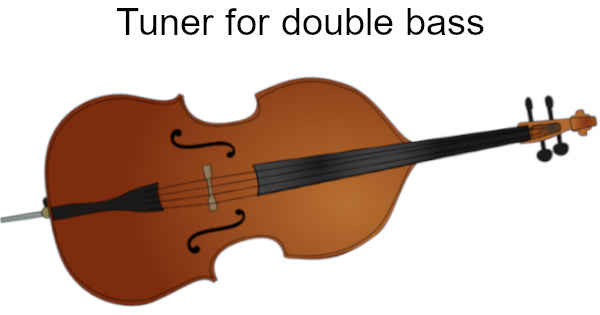This online tuner allows you to tune your double bass.
Instructions:
- Click on start.
- Click on "allow dacapoalcoda.com to use your microphone" (from your webcam, for example).
- At any time, you can choose the reference note A (440Hz, 441Hz, 442Hz, or other).
Advantages of an online tuner?
- No need to install any application or software.
- Works on all devices: computers, mobiles, tablets, etc.
- Reliability.
Tuning Your Double Bass
To tune your double bass using this online tuner, here's what to do:
- With this tuner, click start.
- Click on "allow dacapoalcoda.com to use your microphone".
- Choose the reference A (440Hz, or generally 442Hz).
- Play the string you want to tune with the bow.
- Check the accuracy of the tuning:

The slider is in the middle: you're perfectly in tune!

The slider is on the left: you're too low, you need to tighten the string by turning the pegs or using the fine tuners on the tailpiece.

The slider is on the right: you're too high, you need to loosen the string by loosening the pegs or using the fine tuners on the tailpiece.
You'll need to tune the four strings, C, G, D, and A:
Before rehearsals, all the string instruments in the orchestra tune to an A, as they all have an open string that produces an A. So, it's preferable to start with the A string of the double bass even if you're playing alone:
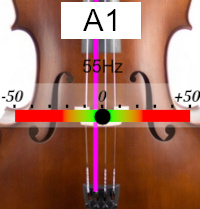
Tuning the A string (A1), by tightening or loosening the pegs. The A string should turn violet (on the tuner, not on the bass, otherwise it might be on fire )
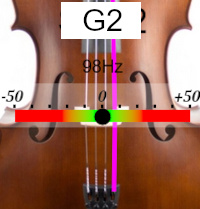
Tuning the G string (G2), by tightening or loosening the pegs. The G string should turn violet.
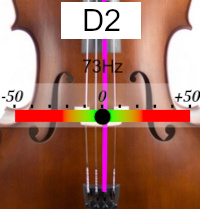
Tuning the D string (D2), by tightening or loosening the pegs. The D string should turn violet.
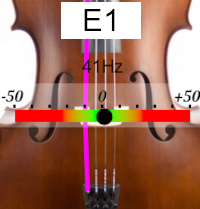
Tuning the E string (E1), by tightening or loosening the pegs. The E string should turn violet.
After tuning each string individually, briefly recheck the tuning of the four double bass strings.
Some Tips
- New strings quickly lose their tuning; after changing a string, it needs more frequent tuning.
- If the strings don't hold the tuning, perhaps the pegs are poorly adjusted.
- Avoid over-tightening while tuning, as beyond a tone and a half higher, the risk of breaking the string is high.



